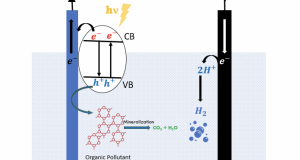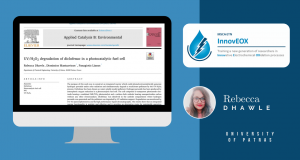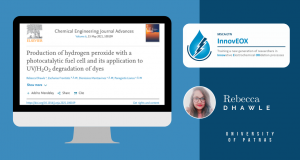With rising water quality standards, it is of great importance to develop processes that can efficiently remove recalcitrant pollutants which are resistant to conventional water treatment methods. While developing such processes, the energy efficiency and the economy of the process plays a key role as implementation of these process on large scale can only happen if they are economically feasible. ...
Read More »Rebecca
UV/H2O2 degradation of diclofenac in a photocatalytic fuel cell
University of Patras researchers have developed an integrated reactor which could photoelectrocatalytically generate hydrogen peroxide under solar radiation and simultaneously degrade a recalcitrant pollutant by the UV/H2O2 process. This work, which was published in Applied Catalysis B: Environmental journal, was performed in the framework of the H2020 MSCA-ETN InnovEOX project. Main author: InnovEOX researcher Rebecca Dhawle. The purpose of this ...
Read More »BIOCHAR: A sustainable material for AOPs
We are always looking for cheaper and sustainable materials irrespective of the industry or sector we work for, to develop new processes which are as cost-effective as possible. I am Rebecca Dhawle, a chemical engineer and ESR 06 based in University of Patras, Greece. And while digging through loads of research material, I found that biochar was being investigated as ...
Read More »Production of hydrogen peroxide with a photocatalytic fuel cell and its application to UV/H2O2 degradation of dyes
University of Patras researchers have developed a process for the production of hydrogen peroxide with a photocatalytic fuel cell and its application to UV/H2O2 degradation of dyes. This work, which was published in Chemical Engineering Journal Advances, was performed in the framework of the H2020 MSCA-ETN InnovEOX project.
Read More » InnovEOX Innovative Electrochemical OXidation Processes for the Removal and Analysis of micro-pollutants in water streams
InnovEOX Innovative Electrochemical OXidation Processes for the Removal and Analysis of micro-pollutants in water streams



